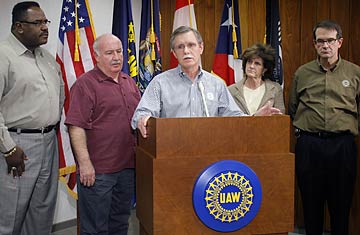
United Auto Workers president Ron Gettelfinger (C) holds a press conference at UAW headquarters Nov. 20, 2008, in Detroit. Gettelfinger called for the Federal Government to implement an immediate emergency rescue plan for the nation's auto companies.
The United Auto Workers' bargaining committees from General Motors, Ford Motor Co. and Chrysler LLC are scheduled to meet in Detroit this week, facing pressure to make additional contract concessions in order to secure federal aid for the struggling automakers.
With GM and Chrysler nearly bankrupt, Harley Shaiken, a professor of labor relations at the University of California, Berkeley, says UAW President Ron Gettelfinger wants to do all he can to help the automakers, including changing the contract if necessary. But UAW leadership is also angling for a seat on GM's board of directors, according to a posting on the website of UAW Local 2404. (See pictures of the remains of Detroit.)
Last week, Gettelfinger agreed to defer the automakers' scheduled payment to the voluntary employee benefit associations, or VEBAs, that is due next year. The VEBAs were created to help finance health care for retired workers. "This was a huge gamble for Gettelfinger," says Shaiken. Gettelfinger also suspended the controversial jobs bank, cutting off payments to some 3,600 workers idled by plant closings at the three companies. According to the local's website, the demand for board representation was linked to these concessions.
Any new concessions could be more complicated. While Gettelfinger had the authority to make the changes in VEBAs and the jobs bank, he does not have the same authority to change other aspects of the existing contract without a vote by active workers. For example, according to William C. Andrews, managing director of the automotive advisory group at the consulting firm of BBK in Southfield, Mich., the UAW membership holds an effective veto over any "prepackaged" bankruptcy — which must be approved by all parties before it is filed, as opposed to a regular bankruptcy, in which the judge can change labor contracts — while the union retains the right to strike.
So far, though, the UAW is not sure what further concessions it will be asked to make. "They really haven't told us what they want," said one UAW bargainer when asked about what the union was prepared to give up. However, a rollback in wages, benefit cuts and a reduction in paid time off are all expected to be on the able when the union committees meet this week. Gettelfinger, however, stresses that other parties including dealers, suppliers, bondholders and salaried employees, need to make concessions as well.
But further concessions are a "very sensitive issue for the union," says Shaiken. The battles over concessions have reopened old wounds in an industry long known for class warfare. Detroit's auto companies are organized around a strict hierarchy, with little of the "all for one, one for all" spirit that is more typical of start-up companies in Silicon Valley. Executives from Ford bluntly told union bargainers during one meeting last year that "shared sacrifice," a concept used during the industry's last crisis in the early 1980s, no longer applied because executives' high salaries were based on Ford's successful global operations.
Until three years ago, the UAW's bargaining strategy was driven by a "no-concession" policy, though it did limit wage demands in exchange for richer pension and health-care benefits. Over the last three years, however, the union has reluctantly rewritten contracts with Ford, General Motors and Chrysler LLC, often over the strong objections of many union members.
In late 2005, workers at Ford came within a few dozen votes of scuttling a plan that offered the company relief from skyrocketing health-care costs by raising co-pays and deductibles. At Chrysler, the same cuts never came to a vote because the union's Chrysler council, which is made up of top local union officers, opposed the cuts even though the union board had recommend approval.
Intense opposition from ordinary union members also delayed for several months a settlement with the bankrupt Delphi Corp., the component maker spun off by GM. The tussle with the union contributed significantly to Delphi's inability to put together a plan to emerge from bankruptcy ahead of the credit crunch.
Earlier this year, the UAW struck a key GM parts supplier, American Axle Holding Inc. in Detroit, for 83 days, when union leaders sensed they could not sell the proposed pay and benefit concessions to union members. The strike wound up costing GM, American Axle's key customer, more than $2 billion, according to the company's financial reports. The contract finally approved, though marginally better than the company's first proposal, still included wage cuts.
Meanwhile, the UAW has allowed new employees to be hired at lower wages. Under the 2007 contracts it signed with GM, Ford and Chrysler, new blue collar workers start at $14 per hour, rather than the $28 per hour paid senior employees. New workers also get a 401(k), instead of a defined-benefit pension plan, and a restricted menu of health-care plans.
The contracts the union signed and ratified with GM, Ford Motor Co. and Chrysler last year, over significant internal opposition, also represent a 5% cut in real wages because money from the automatic cost-of-living escalator that has been a feature of UAW contracts for more than half a century was diverted to cover health-care expenses, says Amy Bronson, who recently retired from Chrysler LLC and is now working on a Ph.D. at Wayne State University in Detroit. Union members also paid more for health care and gave ground on work rules, which critics claim drive up operating costs. In many plants, the work rules have been virtually eliminated, she says.
